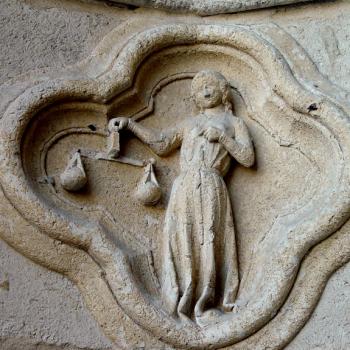
Christians should look to others, to non-Christians, with hope and love. They should see the zeal others have for their religious faith as a good thing, even if it might in some fashion or another be misplaced. Certainly, such misplaced zeal is not only to be found with non-Christians: many Christians likewise have it, as can be seen in the way it has many of them glorify themselves with triumphalist rhetoric which they use to denigrate others. Zeal is good, but like many good things, it can be abused, and so it must be engaged properly. Paul understood this, in part, because he saw the way his own zeal once led him to do bad things like persecute Christians. Yet, its positive value can be seen in the way it helped him become a major figure in Christian history. Even after his conversion, his zeal could cause problems, as it often made him difficult to work with, but all in all, after he became a Christian, his zeal was tempered with love, allowing him to act in far better ways than he did before his encounter with the resurrected Christ. Instead of looking at others with hatred, instead of using his zeal to hurt those who did not believe like he did, Christ taught him to use his zeal to care for everyone, including unbelievers. He came to desire others, especially unbelievers, to receive the grace he received. Thus, instead of hunting down and persecuting those who didn’t believe like him, Paul came to hope for and desire the salvation of all. He understood if he were to work for that objective, he should show others love instead of scorn. He revealed all of this when he wrote: “Brethren, my heart’s desire and prayer to God for them is that they may be saved. I bear them witness that they have a zeal for God, but it is not enlightened” (Rom. 10:1-2 RSV).
Sadly, it seems, many Christians did not learn this lesson upon conversion, nor do they learn it when they read Scripture. They often embrace the zeal Paul had before his conversion, not the one he had afterward. This can be seen in the way Christians, over time, came to blows with non-believers, Jewish and pagan alike, using the power and authority they had in society to denigrate and harm non-Christians. Antisemitism would be impossible if Christians loved others as they should. Instead, they believed the only thing Paul did wrong was persecute Christian, for Christians had the true faith. Many came to believe, and many, it seems, still believe, that it is fine to persecute others, to denigrate them and their human dignity, to limit their freedom, if their beliefs and practices differs from those of Christians. Indeed, the more Christians came to think like this, the more they demonized the others, as can be seen in the way antisemitism rose in history, and Jews became demonized.
Christians, therefore, lost the love they were meant to have. They might have come to some good, pious beliefs, they might have learned some doctrinal truths, but they lost sight of the greater truth. Jesus said that those who believe in him should do more than merely believe, but follow after him and his ways. If they loved him, they would do as he said, which was to love others. Sadly, so many don’t. They continue to demonize others, finding excuses to ignore their rights. Christians, indeed, often show more concern with the appearance of holding to the truth than they are in doing what Christ expects of them. Christians have all kinds of zeal, but for so many of them, it has become a misplaced zeal, as it is more about how to engage others due to their differences, finding reasons to suppress the rights of others, than it is to lift others up with the love Christ told them to show. As such, is there any surprise that those who suffer from the contempt Christians show them have little to no interest in what Christianity has to offer? For non-Christians, Christianity seems to be a cult which seeks to dominate the world around them. It appears as if anyone who doesn’t think or act the way Christians think they should are seen as contemptible, and with such contempt, Christians let hate, not love, show forth in the way they act. Obviously, this is not the way of Christ, and it is not what Paul himself learned. So many Christians believe and act opposite of the teachings of Christ. This is why it is easy to say that the spirit of anti-Christ, though it is not exclusive to Christians, has come to find a way to influence them, shown by the way so many Christians can then be marshaled to support cruel, hateful political policies.
Paul’s demons were exorcised when he became a Christian. He saw beyond the exclusiveness which he once had when he was a non-Christian. When he saw the error of his ways, he did what he could to live out the way of love. He desired the best for all, including, indeed, especially for those who were not Christians like him. Zeal can be good. When it is not enlightened, when it is joined with malice, then, it has, as it were, become under demonic control, and what is necessary is for that demonic power to be cast out. Malice needs to be replaced by love. Hate is never the answer, be it antisemitism, or hate for the foreigner, or hate for someone whose way of life is different from one’s own. Zealous hate only destroys, showing forth the sin which lies at its center. The answer is love. That is the way of Christ. That is what Paul learned. Why has this been forgotten by Christians?
Stay in touch! Like A Little Bit of Nothing on Facebook.
If you liked what you read, please consider sharing it with your friends and family!
N.B.: While I read comments to moderate them, I rarely respond to them. If I don’t respond to your comment directly, don’t assume I am unthankful for it. I appreciate it. But I want readers to feel free to ask questions, and hopefully, dialogue with each other. I have shared what I wanted to say, though some responses will get a brief reply by me, or, if I find it interesting and something I can engage fully, as the foundation for another post. I have had many posts inspired or improved upon thanks to my readers













